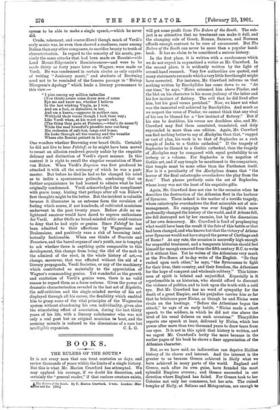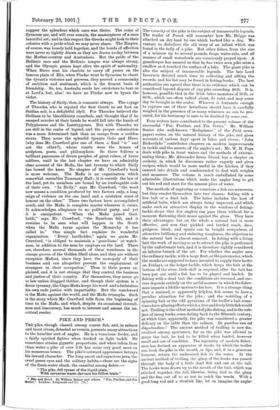BOOKS.
THE RULERS OF THE SOUTH.* IT is not every man that can treat centuries as days, and review thousands of years within the limits of a single history. But this is what Mr. Marion Crawford has attempted. We may applaud his courage, if we doubt his discretion, and certainly the "general reader," if that curious creature exists,
LThe Rulers of the South. By P. Marion Crawford. 2 vols. London : Mao- =Man and Co. [21s.]
will get some profit from The Rulers of the South. The sub- ject is so attractive that no treatment can make it dull, and the changing rule of Greek, Roman, Saracen, and Norman affords enough contrast to be sure of amusement. But The Rulers of the South can never be more than a popular hand- book. It has no claim to be considered a serious history.
In the first place, it is written with a carelessness which we do not expect in so practised a writer as Mr. Crawford. In the second place, it is evidently written by the light of second-hand research. Very few authorities are quoted, and many statements are made which a very little forethought might have corrected. For instance, Mr. Crawford informs us that nothing written by Bacchylides has come down to us. "At one time," he says, " Hiero esteemed him above Pindar, and the blot on his character is his mean jealousy of the latter and his low instinct of flattery. The evil that he did lived after him, but his good verses perished." Now, we know not what was the immortal evil achieved by Bacchylides. And much as we respect the verse of Pindar, we cannot think that any rival of his can be blamed for a "low instinct of flattery." But if his sins be deathless, his verses are deathless also, and Mr. Crawford may find them annotated, translated, and duly expounded in more than .one edition. Again, Mr. Crawford can find nothing better to say of JEschylus than that, "rugged or vast of plan, his work is to that of Sophocles as a rock temple of India to a Gothic cathedral." If the tragedy of Sophocles be likened to a Gothic cathedral, then the tragedy of 2Eschylus may be compared with equal probability to an iceberg or a volcano. For Sophocles is the negation of Gothic art, and if any temple be mentioned in the comparison, that temple must be none other than the Parthenon itself. Nor is it a peculiarity of the 2Eschylean drama that "the horror of the final catastrophe overshadows the play from the first." That phrase perfectly suits the art of Sophocles, whose irony was not the least of his exquisite gifts.
Again, Mr. Crawford does not rise to the occasion when he describes the destruction a the Athenian fleet in the harbour of Syracuse. There indeed is the matter of a terrific tragedy, whose catastrophe overshadows the first miserable act of mis- management. No campaign was ever fought which more profoundly changed the history of the world, and if Athens fell, she fell destroyed not by her enemies, but by the dissensions of her own democracy. Mr. Crawford is fond of prophesying what would have been the result if the fate of this battle or that had been changed, and who knows but that the victory of Athens over Syracuse would not have stayed the power of Carthage and- of Rome? At any rate, the occasion is assuredly high enough for respectful treatment, and a temperate historian should feel himself far enough removed from the fifth century B.C. to write of it without bias. Yet he writes of the Athenians very much as the Pro-Boers of to-day write of the English. "So they rushed upon each other," he says, "the Syracusans to fight for their lives, their country, and their freedom, the Athenians for the hope of conquest and wholesale robbery." This bitter- ness of spirit is belated and unjustified. Especially is it reprehensible in an historian, who should afford to discount the violence of politics, and to look upon the truth with a cold eye. But Mr. Crawford has no word of sympathy for the death of a great Empire, and his prejudice carries him so far that he belabours poor Nicias, as though be and Nicias were rivals on the hustings. "Before the Athenians began the attack," he says of an early battle, "Nicias made a short speech to the soldiers, in which he did not rise above the level of his usual dulness on such occasions." Thucydides reports one speech at least, delivered by Nicias, which has power after more than two thousand years to draw tears from our eyes. It is not in this spirit that history is written, and we regret Mr. Crawford's levity the more because in the earlier pages of his book he shows a finer appreciation of the Athenian character.
But, as we have said, no indiscretion can deprive Sicilian history of its charm and interest. And the interest is the greater to us because Greece achieved in Sicily what we have achieved in many parts of the world. England and Greece, each after its own guise, have founded the most splendid Empires oversea ; and Greece succeeded in one direction where England has failed. For Greece took to her Colonies not only her commerce, but her arts. The rained temples of Sicily, at Selinus and Metaponttun, are enough to suggest the splendour which once was theirs. The coins of Syracuse are, and will ever remain, the masterpieces of a once beautiful art; and in this respect the Greeks might look to their colonies with a pride which we may never share. The Empire, of course, was loosely held together, and the bonds of affection were never so tightly drawn as they are drawn to-day between the Mother-country and Australasia. But the pride of the Hellenic race and the Hellenic tongue was always strong, and the Olympic games kept alive the spirit of nationality. When Hiero sent his chariots to carry off prizes on the famous plain of Elia, when Pindar went to Syracuse to chant the tyrant's victories and prowess, they proved a community of ambition and sentiment, which is the firmest basis of friendship. So, too, Australia sends her cricketers to beat us at Lord's, but, alas ! we have no Pindar now to hymn the victor.
The history of Sicily, then, is romantic always. The voyage of Theocles, who is reputed the first Greek to set foot on Sicilian soil, is a delightful idyll. For Theocles believed the Sicilians to be bloodthirsty cannibals, and thought that if he escaped murder at their hands he would fall into the hands of Polyphemus and the Laestrygones. But with Theocles we are still in the realm of legend, and the proper colonisation was a more determined task than an escape from a sudden storm. Then arose the splendid tyrants Gelo and Hiero (why does Mr. Crawford give one of them a final " n " and not the other F), whose courts were the homes of sculptors, poets, and philosophers. So there follows a brilliant panorama of divers peoples, of great rulers, of brave soldiers, until in the last chapter we have an admirably clear aecount of the Mafia, the last tyranny to which Sicily has bowed the knee. No chapter of Mr. Crawford's book is more welcome. The Mafia is an organisation which somewhat resembles Tammany Hall ; it is outside the law of the land, yet its members are bound by an irrefragable code of their own. "In Sicily," says Mr. Crawford, "the word now means a condition produced by two factors only, a long reign of violence on the one hand and a mistaken sense of honour on the other." These two factors have accomplished much, and the Mafia is complete master wherever it exists. It acknowledges allegiance to no political party, and yet it is omnipotent. "When the Mafia joined Gari- baldi," says Mr. Crawford, "the Bourbons fell, and it remains to be seen what Al happen in the South when the Mafia turns against the Monarchy it has called in." One simple fact explains its wonderful organisation. "Every landholder," again we quote Mr. Crawford, "is obliged to maintain a guardian° ' or watch- man, in addition to the men he employs on the land. There are, therefore, several thousands of these watchmen in the orange groves of the Golden Shell alone, and they are without exception Mafiosi, since they have the monopoly of their business and can altogether prevent the employment of strangers in their occupation." Thus is their power ex- plained, and it is not strange that they control the business and justice of their country. For themselves, they never go to law unless dragged thither, and though their system is a fierce tyranny, the Capo-Mafia keeps his word and administers his own rude justice with impartiality. But the watchword is the Mafia against the world, and the Mafia triumphs. Such is the story which Mr. Crawford tells from the beginning of time to the Mafia, and which, despite its occasional slovenli- ness and inaccuracy, has much to interest and amuse the un- critical reader.







































 Previous page
Previous page